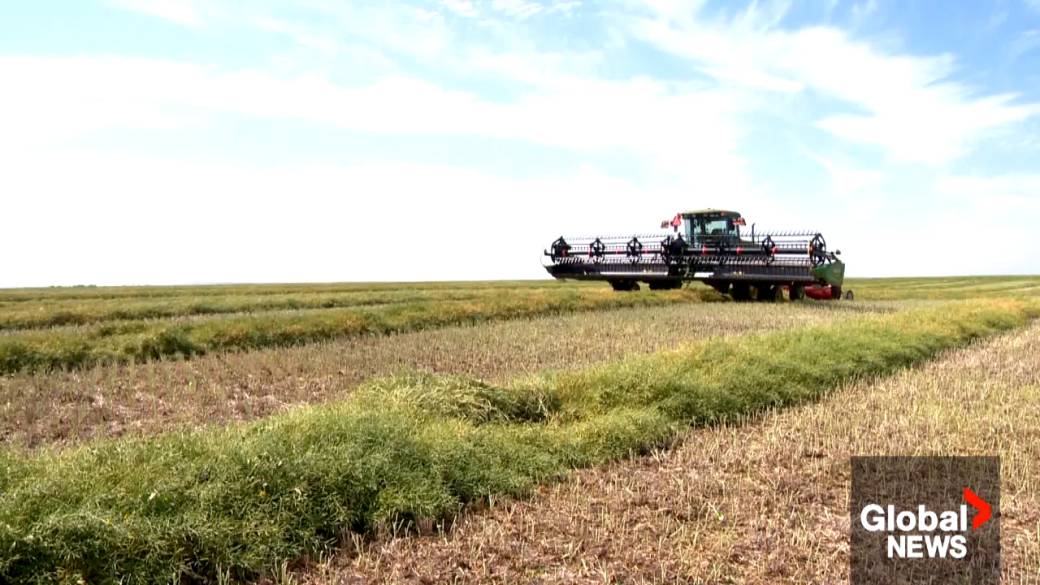China Seeks New Canola Partners Amidst Canada Trade Tensions

Table of Contents
The Canada-China Canola Trade Dispute: A Deep Dive
The Canada-China canola trade dispute is a complex issue rooted in a series of accusations and counter-accusations. China, citing concerns about the presence of pests and weeds in Canadian canola shipments, imposed tariffs and restrictions, significantly impacting Canadian canola exports. These actions effectively shut out a major market for Canadian farmers, leading to substantial economic losses. The dispute also highlights the vulnerability of relying heavily on a single export market and the intricate interplay between agricultural trade and international diplomacy.
- Timeline of key events: The dispute escalated significantly in 2019, with China imposing initial restrictions on Canadian canola imports. Subsequent investigations and ongoing negotiations have failed to resolve the issue completely.
- Economic impact on Canadian canola producers: Canadian canola farmers experienced significant financial hardship due to the loss of the Chinese market, impacting farm incomes and potentially leading to farm closures. This has had cascading effects throughout the Canadian agricultural economy.
- Political implications: The trade dispute added strain to already fragile Canada-China diplomatic relations, impacting broader trade discussions and illustrating the political ramifications of agricultural trade disagreements. The dispute also underscored the importance of diversification in export markets for agricultural producers.
China Explores Alternative Canola Sources
Faced with reduced Canadian canola imports, China is actively diversifying its sources. Several countries are emerging as potential alternative suppliers, each presenting unique advantages and challenges:
- Overview of canola production in key alternative countries: Australia, Ukraine, Russia, and Brazil are among the countries capable of increasing canola production to meet some of China's demand. Each country has different production capacities, growing seasons, and logistical considerations.
- Comparison of canola quality and price from different sources: The quality and price of canola vary significantly between these countries, impacting China's choices. Factors such as transportation costs and potential trade agreements also play a crucial role.
- Analysis of logistical challenges and potential trade agreements: Shipping distances, port infrastructure, and potential trade barriers create logistical complexities. China is likely to negotiate new trade agreements to secure reliable and cost-effective canola supplies.
The Role of Australian Canola in Filling the Gap
Australia is well-positioned to become a major canola supplier to China. Existing trade relationships and relatively close proximity offer advantages. However, Australia's production capacity and the potential for increased demand from other markets need careful consideration. The strength of China-Australia trade relations will play a significant role in determining the volume of Australian canola exports to China.
Ukraine and Other Eastern European Options for Canola Supply
Ukraine possesses substantial canola production capacity. However, ongoing geopolitical instability and potential supply chain disruptions present significant risks. Other Eastern European countries may also offer opportunities but face similar logistical and geopolitical challenges. The security of these supply routes is a major concern for China.
Implications for the Global Canola Market
The shift in canola trade has significant implications for the global market. Increased competition among suppliers could lead to:
- Predicted impact on global canola prices: The changes could create volatility in global canola prices, impacting both producers and consumers.
- Potential for new trade agreements and alliances: We might see the emergence of new trade agreements and alliances as countries compete to secure access to the Chinese market.
- Long-term effects on agricultural production and supply chains: The long-term consequences could reshape agricultural production patterns and supply chains worldwide, influencing investment in canola production and infrastructure.
Conclusion
China's search for new canola partners, driven by trade tensions with Canada, is reshaping the global canola market. The implications are far-reaching, impacting global prices, supply chains, and international relations. Australia, Ukraine, and other countries are vying to fill the void left by reduced Canadian exports, each presenting unique opportunities and challenges. The ongoing developments in this dynamic situation highlight the intricate interplay between agricultural trade, geopolitics, and food security.
Call to Action: Stay informed about the evolving landscape of the global canola market and the ongoing developments in China's search for new canola partners. Follow our blog for updates on this and other significant agricultural trade stories.

Featured Posts
-
 Europes Nuclear Future A French Ministers Proposal For Shared Security
May 09, 2025
Europes Nuclear Future A French Ministers Proposal For Shared Security
May 09, 2025 -
 King Pro Maska Ta Trampa Zrada Na Korist Putina
May 09, 2025
King Pro Maska Ta Trampa Zrada Na Korist Putina
May 09, 2025 -
 Stiven Fray Ot Aktera K Rytsaryu
May 09, 2025
Stiven Fray Ot Aktera K Rytsaryu
May 09, 2025 -
 Aeroport Permi Zakryt Iz Za Snegopada Chto Izvestno
May 09, 2025
Aeroport Permi Zakryt Iz Za Snegopada Chto Izvestno
May 09, 2025 -
 Elon Musks Brother Kimbal Musk Philanthropy Restaurants And Politics
May 09, 2025
Elon Musks Brother Kimbal Musk Philanthropy Restaurants And Politics
May 09, 2025
